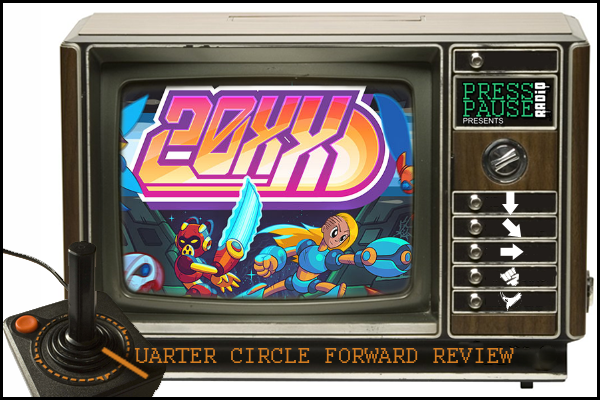QCF: 20XX (Switch)

 ega Man is a pretty formulaic game. Fight six to eight combat-enabled re-purposed robots by using other robots' weapons against them rock-paper-scissor style, then take on a few extra nefarious machinations before defeating a balding, mad scientist with illusions of grandeur and seriously questionable choices in home decor. There have been 10 of these so far with an 11th on the horizon, so the setup seems to work. So much so, actually, that a parallel, edgier series with an X tacked on that incorporates caped villains, mysterious allies including one with long, flowing blonde hair and a cyberzoo's-worth of crazy mechanical fauna also, itself, saw a solid 8 entries. And an RPG.
ega Man is a pretty formulaic game. Fight six to eight combat-enabled re-purposed robots by using other robots' weapons against them rock-paper-scissor style, then take on a few extra nefarious machinations before defeating a balding, mad scientist with illusions of grandeur and seriously questionable choices in home decor. There have been 10 of these so far with an 11th on the horizon, so the setup seems to work. So much so, actually, that a parallel, edgier series with an X tacked on that incorporates caped villains, mysterious allies including one with long, flowing blonde hair and a cyberzoo's-worth of crazy mechanical fauna also, itself, saw a solid 8 entries. And an RPG.
20XX, while very obviously inspired by the Rockingest Man of X himself, is not such a game, despite the many mechanics it borrows. If you've ever wondered what Mega Man X would be like if it were a completely differently structured roguelite, well, we might have the answer for you.
In 20XX, players take on the game with a robot warrior named Nina, who takes heavily after Mega Man X's titular X. She has a normal shot and a charged attack, just like the X buster and players can traverse any given stage with dashes, wall-jumps and more—another player character, Ace, very obviously mirrors Mega Man X's Zero, complete with an identical beam sword attack to start. 20XX plays over the course of several stages in one of three difficulties: Reverent (easy,) Normal (duh,) and Defiant (hard.) Each cleared stage gives the player a choice of what kind of enhancements, weapons or bonuses they will receive, as well as what stage to travel to next from a possible three.

Players can also opt to save and quit. In any given play-through, three lives are available to work with; if all are lost in a single session, the player dies, and all collected weapons and enhancements are lost. Players won't be killed if they fall off of a ledge or land in lava; instead, they'll just take damage. If a player loses all of their life energy, they will die and move onto their next stocked life until they are all gone. Then it's Game Over.
There are all kinds of bonus chests and crates randomly thrown into each stage that will drop various currencies, health and power recovery and even game-changing enhancements like armor or main weapon alterations, like the insanely OP Star cannon which can fire in four directions at once, including charged shots. The best enhancements come from special challenge rooms that task players with defeating all opposition within a fixed time limit. If the player succeeds, they get an enhancement. Fail and it's out with no extra goodies and maybe less health, if players are careless. Any overall stage can award the player with bonus money or health if it is completed in a fast enough time.
At the end of each stage, players square off against a powerful boss that will test the player with heavy firepower and fast movement patterns. Though any of these bosses can be taken care of with the regular cannon, players can also use special weapons obtained from other bosses to do much more damage. Three of these weapons can be held at a time in slots under the player's life and energy gauges and are activated by their specified inputs. All of these special weapons require energy to operate, indicated with blue bars. Players can recover this energy with energy capsules. Like life pickups, small and large energy capsules exist and can be dropped from enemies or crates.

Players that need a bit more assistance with their progress can also activate a number of permanent upgrades by way of collected soul chips. Various effects such as enhanced life, extra crate drops and more can be toggled on or off before a player's run starts. Other items can also be unlocked by using Soul Chips collected in the player's travels. This can help novices make decent progress in the game, if they need a helping hand. Unlike normal weapons and enhancements, these permanents are not lost if the player gets game over.
Soul Chips aren't the only currency in 20XX either. Nuts and tokens can also be collected and spent in various spots, both at the game's main hub or in stages themselves. As always though, what collectibles are found are totally randomized in every playthrough, adding a ton of replay to the whole thing.
In addition to the main game, Players have access to a number of Daily and Weekly challenges that have the player take on the game under various prescribed conditions, depending what's on tap through the game's online servers. Daily and weekly normal and hardcore challenges, as well as Rush Job and Speed Racer modes all, exist for players to challenge themselves every day. Once taken on, they will lock until the next day or week, respectively. One aspect of 20XX that is completely unlike Mega Man X though, is the ability to play the game in a co-operative 2-Player manner, which is all kinds of neat. But especially with areas that require a lot of jump precision, it doesn't work especially well in the end. That it was included at all is, at the very least, pretty interesting though. At least the effort was made!
Visually, 20XX works pretty well. There's a good amount of parallax to the environments and plenty of neat, animated touches to the stages on the whole. Player character animation, on the other hand, is a bit janky with a ton of tweening applied to a handful of independent pieces. It's pretty jarring. One of the coolest aspects of 20XX's visuals is that every major upgrade Nina or Ace picks up will reflect on the character sprite, something that even carries over to the silhouette on the loading screen.

In terms of performance, 20XX runs smoothly for the most part, though there are also some pretty heavy load times which can kind of put a damper on the player's momentum. There's also the intro cinema which, despite being made up of simple sprites, is especially choppy and can often speed through without pause. We can barely tell what's going on in it most times.
The sound is a little less of a mixed bag. On the one hand, 20XX's soundtrack is pretty retrolicious, featuring a number of great, standout tracks and mostly satisfying sound effects for everything from shots to that make a good case for the game from an audio standpoint. On the other, Nina's VO is really, really irritating. At the very least though, there's some decent writing throughout the whole game, specifically between the Dr. Light and Dr. Wily-a-likes that are apparently on the same side here. A nice twist, if we do say so ourselves.
But on the whole, 20XX is fun to play and ever so slightly scratches that Mega Man itch wherever one may be – at least when it comes to the Switch version - despite its very different gameplay approach. For about US$18.00, it has a decent amount of value, thanks to its wide range of challenge modes and super-replayable structure.

 20XX,
20XX,  Batterystaple Games,
Batterystaple Games,  Blue Bomber,
Blue Bomber,  Chris King,
Chris King,  Love Letter,
Love Letter,  Mega Man,
Mega Man,  Mega Man XX,
Mega Man XX,  Nintendo Switch | in
Nintendo Switch | in  QCF Reviews
QCF Reviews 









